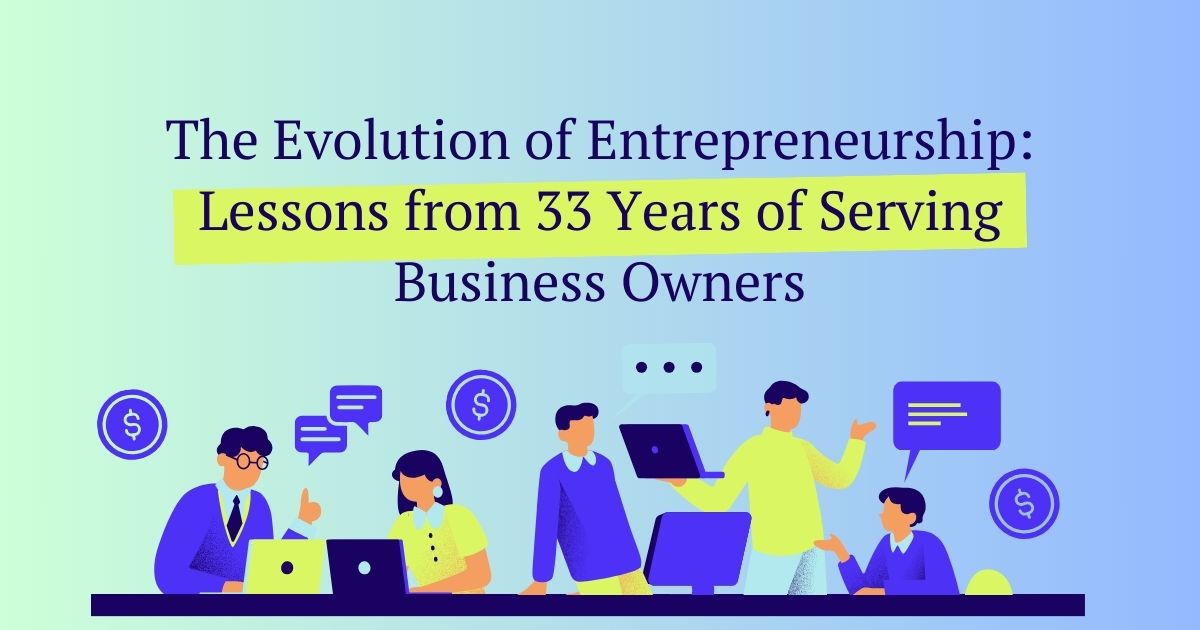Entrepreneurship, the backbone of innovation and economic growth, has undergone significant changes over the past three decades. As we reflect on this journey, it’s evident that the evolution of entrepreneurship is not just about adapting to market trends but also about fostering a robust community that supports and empowers entrepreneurs. Our business community, having served entrepreneurs for 33 years, stands as a testament to the power of adaptability, resilience, and community building. This retrospective look will explore the key changes in entrepreneurship, the trends that have shaped the landscape, and how our community has not only adapted but thrived through these transformations.
The Early Years: The Rise of the Solo Entrepreneur
In the late 1980s and early 1990s, entrepreneurship was largely characterized by the rise of the solo entrepreneur. This period saw a surge in individuals leaving traditional employment to start their own businesses. The barriers to entry were lower, and the concept of bootstrapping became popular. Entrepreneurs relied heavily on personal savings, family, and friends for initial funding. Our community was founded during this era, providing a platform for these solo entrepreneurs to connect, share resources, and support each other.
During these early years, the primary focus was on survival and establishing a foothold in the market. Entrepreneurs were generalists, wearing multiple hats and handling everything from marketing to accounting. Our community played a crucial role in offering workshops and seminars that equipped entrepreneurs with the diverse skills needed to manage their businesses effectively. Networking events and peer support groups helped build a sense of camaraderie, reducing the isolation often felt by solo entrepreneurs.
The Dot-Com Boom and the Rise of Tech Startups
The late 1990s and early 2000s witnessed the dot-com boom, a period marked by the rapid growth of internet-based businesses. This era brought a shift from traditional brick-and-mortar businesses to tech startups. Venture capital became more accessible, and the emphasis shifted to scalability and rapid growth. Our community adapted by incorporating technology-focused workshops and creating partnerships with tech incubators and accelerators.
The dot-com boom also highlighted the importance of having a strong online presence. Entrepreneurs needed to understand web development, digital marketing, and e-commerce. In response, our community introduced specialized training programs and invited industry experts to share insights on leveraging the internet for business growth. The collaborative spirit of our community facilitated the sharing of technological resources and knowledge, helping members stay ahead in the rapidly changing landscape.
The Burst of the Dot-Com Bubble and the Resilience of Entrepreneurs
The early 2000s also brought the burst of the dot-com bubble, leading to a wave of failures among tech startups. This period was a test of resilience for many entrepreneurs. Those who survived had to pivot their business models, cut costs, and find new ways to generate revenue. Our community provided critical support during this challenging time, offering crisis management workshops, financial planning advice, and mental health resources to help entrepreneurs navigate the downturn.
One of the key lessons from this period was the importance of adaptability and diversification. Entrepreneurs learned to build more sustainable business models and to not rely solely on external funding. Our community’s emphasis on fostering a supportive environment helped many members weather the storm and emerge stronger. The relationships built during this time reinforced the value of having a solid support network in times of crisis.
The Rise of Social Media and the Influence of Digital Marketing
The mid to late 2000s saw the rise of social media platforms like Facebook, Twitter, and LinkedIn. These platforms revolutionized the way entrepreneurs marketed their businesses, enabling them to reach a global audience with minimal cost. Our community quickly recognized the potential of social media and integrated digital marketing strategies into our training programs.
Social media not only changed marketing but also influenced consumer behavior and expectations. Entrepreneurs had to become more customer-centric, engaging with their audience and building authentic relationships. Our community facilitated this shift by organizing social media workshops, providing access to digital marketing tools, and creating forums for members to share their successes and challenges in the digital space.
The Global Financial Crisis and the Shift Towards Lean Startups
The 2008 global financial crisis had a profound impact on entrepreneurship. Access to capital became more difficult, leading to the rise of lean startups. This methodology, popularized by Eric Ries, emphasized creating a minimum viable product (MVP), testing it in the market, and iterating based on feedback. Our community embraced this approach, offering lean startup bootcamps and mentorship programs.
The lean startup movement encouraged entrepreneurs to be more strategic and data-driven. It also highlighted the importance of agility and continuous improvement. Our community’s focus on practical, hands-on learning experiences helped entrepreneurs adopt lean principles and apply them effectively in their businesses. The collaborative nature of our community also enabled members to share their MVPs and gather feedback, fostering a culture of innovation and rapid iteration.
The Gig Economy and the Rise of Freelancers
The 2010s saw the rise of the gig economy, characterized by the increasing number of freelancers and independent contractors. Platforms like Uber, Airbnb, and Upwork provided new opportunities for individuals to monetize their skills and assets. This shift towards a more flexible and decentralized workforce presented both challenges and opportunities for entrepreneurs.
Our community responded by creating specialized programs for gig economy entrepreneurs, offering resources on managing freelance businesses, setting competitive rates, and building a personal brand. We also recognized the need for financial stability and introduced workshops on budgeting, tax planning, and securing health insurance. The support and resources provided by our community enabled gig economy entrepreneurs to thrive and find success in their chosen fields.
The Rise of Social Entrepreneurship and Purpose-Driven Businesses
In recent years, there has been a significant shift towards social entrepreneurship and purpose-driven businesses. Entrepreneurs are increasingly focused on creating positive social and environmental impact alongside financial success. This trend reflects a broader change in consumer values, with people seeking to support businesses that align with their own values.
Our community has always emphasized the importance of purpose and values in business. We have integrated social entrepreneurship into our curriculum, offering courses on sustainable business practices, impact measurement, and ethical leadership. Our members are encouraged to pursue their passions and create businesses that make a difference in the world. The sense of purpose and mission within our community has attracted like-minded entrepreneurs, fostering a culture of collaboration and mutual support.
The Digital Transformation and the Future of Entrepreneurship
The COVID-19 pandemic accelerated the digital transformation of businesses, pushing entrepreneurs to adopt new technologies and adapt to a rapidly changing environment. Remote work, e-commerce, and digital collaboration tools became essential for survival. Our community pivoted quickly, moving our events and training programs online and providing support for digital transformation.
The future of entrepreneurship will undoubtedly be shaped by technology and innovation. Artificial intelligence, blockchain, and other emerging technologies will create new opportunities and challenges for entrepreneurs. Our community is committed to staying at the forefront of these developments, offering cutting-edge resources and training to help our members navigate the evolving landscape.
Building a Thriving Entrepreneurial Community
Throughout the past 33 years, the core strength of our community has been our commitment to building a thriving entrepreneurial ecosystem. We believe that entrepreneurship is not a solitary journey but a collective effort. By fostering a sense of belonging, providing access to resources, and encouraging collaboration, we have created an environment where entrepreneurs can thrive.
Our community’s longevity and success can be attributed to several key principles:
- Adaptability: We have continuously evolved our programs and services to meet the changing needs of entrepreneurs. By staying attuned to market trends and technological advancements, we have ensured that our members are always equipped with the latest tools and knowledge.
- Support: We prioritize the well-being of our members, offering not only business resources but also mental health and wellness support. Entrepreneurship can be a challenging journey, and we believe that a healthy entrepreneur is a successful entrepreneur.
- Collaboration: We encourage our members to collaborate, share resources, and support each other. By fostering a sense of community and mutual support, we have created an environment where entrepreneurs can learn from each other and grow together.
- Purpose: We emphasize the importance of purpose and values in business. Our community members are driven by a desire to make a positive impact on the world, and this shared sense of mission has created a strong and cohesive community.
Conclusion
The evolution of entrepreneurship over the past 33 years has been marked by significant changes and challenges. From the rise of the solo entrepreneur to the digital transformation brought about by the COVID-19 pandemic, entrepreneurs have had to adapt and innovate continuously. Our community has not only weathered these changes but has thrived by staying true to our core principles of adaptability, support, collaboration, and purpose.
As we look to the future, we remain committed to empowering entrepreneurs and fostering a thriving community. The lessons learned over the past three decades have prepared us to face whatever challenges lie ahead, and we are excited to continue supporting the next generation of entrepreneurs. Together, we will navigate the evolving landscape of entrepreneurship and build a brighter future for all.
Ready to join a thriving entrepreneurial community that has been empowering business owners for over 33 years? Join our Inspire Membership for free and gain exclusive access to resources, community support, and expert guidance designed to help you navigate the evolving landscape of entrepreneurship. Start your journey with a community that values adaptability, support, collaboration, and purpose today.

